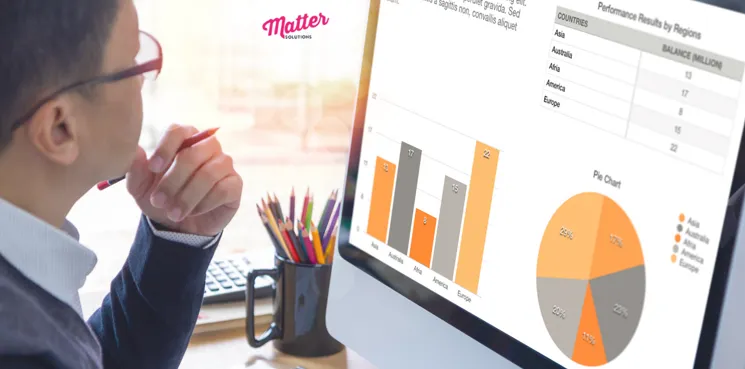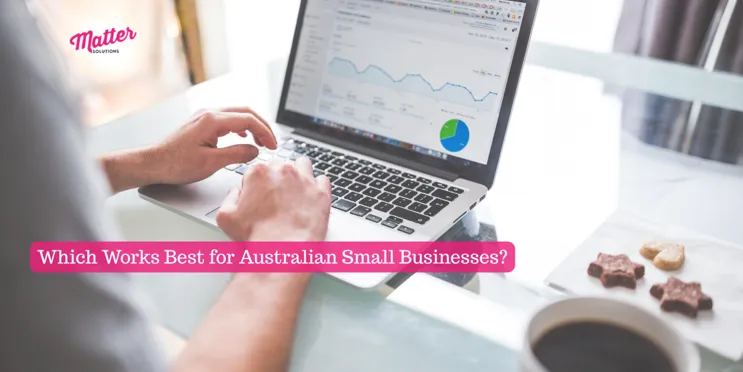With marketing budgets tightening and performance expectations rising, where should your next dollar go: Facebook or Google?
In 2025, choosing between platforms is getting even harder since clicks cost more, and getting a good ROI really matters.
As a comprehensive digital marketing agency,we at Matter Solutions have managed campaigns across both platforms for over a decade. We’re very familiar with what works and what doesn’t.
So today, we’ll break down the differences between these two platforms for you. In this article, we’ll cover costs, strategies, and actual results so you can make smart choices instead of just hoping for the best.
First, let’s define the players and how they stack up.
Facebook Ads vs Google Ads: What You Need to Know
We like to think of these two platforms as different types of stores.
Google Ads works like a hardware store where people walk in knowing exactly what they need. And Facebook Ads is more like a shopping mall where people browse and find things they didn’t know they wanted.

That means both systems use completely different approaches to reach your customers. Google focuses on search intent, while Facebook targets people based on their interests and behaviors.
Now, if that’s clear, let’s get into the details.
Reach and Targeting
Google’s targeting revolves around keywords and what people search for. Case in point: when someone types “best running shoes,” they’re ready to buy. Google also has a massive reach with more than 75,000 search queries every second, averaging out to about 2 trillion searches per year. But your targeting options are pretty basic beyond keywords.
Facebook takes the opposite approach with incredibly detailed targeting. It keeps a mountain of data on its users, so you can target people by age, interests, job title, recent life events, and even behaviors like “frequent travelers.”
Cost per Click (CPC)
Cost per click, or CPC, is simply how much you pay each time someone clicks on your ad. For Google Search ads, the average cost is $2.69 per click, while Facebook ads are usually much cheaper, averaging $0.63 per click across all industries.
But remember, cheaper clicks don’t always mean better results for your business. As we covered, Google’s higher costs often come with people who are more ready to buy.
Ad Formats
Google offers responsive search ads that mix and match your headlines and descriptions automatically. You also get display ads across millions of websites, shopping ads for products, and video ads on YouTube. Plus, the Responsive Search Ads cycle through up to 15 headlines and four descriptions to serve personalized ads.
Facebook gives you more room to express your brand’s personality. You can use single images, videos, carousel ads that let people swipe through multiple products, and collection ads that open into full shopping experiences. In fact, carousel ads alone can drive up to 10 times more traffic to your website compared to regular static ads.
Placement Strategies
Google spreads your ads across search results, YouTube, Gmail, and millions of partner websites through their Display Network. This means you’re meeting people when they’re actively looking for solutions to their problems.
Facebook works differently by placing your ads in news feeds, Instagram, Stories, Messenger, and its network of apps and websites. So here, you’re catching people during their downtime when they’re scrolling and discovering new things.
Next, we’ll talk about what you’re here for: which one can give you better returns on your investment.
Digital Advertising ROI: Which Delivers More in 2025?
Now we’ll take a closer look at which platform delivers more in 2025, comparing ROI for Google Ads and Facebook Ads. We’ll highlight the strengths of each, discuss how conversions differ, and give you a sense of which might work best depending on your business goals.

2025 Insights: The Impact of AI
This year marks a major turning point for digital advertising, and it’s largely because of artificial intelligence. AI-powered tools are quickly becoming the standard way to stay competitive in the market. In fact, advertisers that activate AI Max (Google’s AI-driven bidding and targeting tool) in Search campaigns will typically see 14% more conversions or conversion value at a similar CPA/ROAS.
Consumer habits are also changing at breakneck speed. Today’s online audience expects personalized, mobile-friendly experiences, and the projected $400 billion in mobile ad spending by 2025 proves how much the landscape has changed.
Here’s what that means for Google and Facebook Ads specifically.
Google Ads ROI for High-Intent Searches
Google’s biggest strength is catching people who already want to buy something. You can gauge Google’s performance by its 7.52% average conversion rate in 2025.
Google’s new AI tools are making this even better. Its AI-powered video campaigns on YouTube deliver 17% higher ROAS than manual campaigns. So you’re getting more value for your money when you let the platform handle the optimization work for you.
Facebook Ads ROI for Audience Engagement and Remarketing
Facebook takes a completely different approach, but it delivers impressive results too.
29% of marketers report Facebook gave them the best return on investment (ROI) compared to other social media platforms. The platform really excels at building relationships and carefully nurturing potential customers over longer periods of time.
And guess what? Facebook’s conversion numbers are also quite strong despite using a different tactic. On average, you can expect a conversion rate of about 8.78% for your Facebook ad. Plus, with lower CPC than Google, you often get more chances to test and improve your campaigns without breaking the bank.
When Google or Facebook Works Best
Google dominates when people are actively searching for solutions. If you sell emergency plumbing services, tax preparation, or any product people specifically look for, Google Ads will likely give you better immediate returns.
Facebook wins for discovery-based purchases and complex sales cycles. So when you’re promoting lifestyle products, raising brand awareness, or helping customers learn before they buy, Facebook’s targeting and creative ad formats work best.
So who really wins? Businesses that use both! We recommend leveraging Google to catch people ready to buy and Facebook to build long-term relationships.
Build Your Online Advertising Strategy for 2025
Now, what should you keep in mind from all this? The most successful businesses in 2025 won’t be the ones that pick sides in the Facebook vs Google debate.
Here’s your action plan:
- Align each platform with your specific campaign goals.
- Use Google for high-intent searches, Facebook for brand building.
- Then, test and track performance consistently across both platforms.
- Finally, create retargeting strategies that connect both platforms.
Ready to create a winning strategy that combines the best of both worlds? Contact our team at Matter Solutions to build your comprehensive digital advertising plan.



